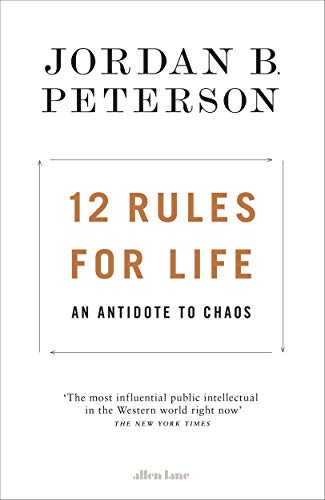
2 Sentence Summary
Jordan B. Peterson’s book, 12 Rules for Life: An Antidote to Chaos, is full of personal stories and anecdotes that are packed with wisdom. This book outlines 12 principles that can help you live a life filled with integrity, contentment, and joy. It’s truly an antidote to chaos.
Summary Read Time: Less than 5 minutes
Actual Book Length: 409
First Published in: 2018
Below is the detailed yet quick summary of the book:
Rule 1 – Fix Your Posture
As hierarchies are a prevalent and ever-present social norm in many cultures globally, you can give yourself a competitive edge by simply exhibiting good posture.
Research has demonstrated that those who suffer from alcoholism or depression are less likely to enter into any sort of competition.This only leads to further Inactivity and struggles with self-esteem and depression.
Therefore, if you’re looking to give yourself an advantage, remember the first rule: always hold your head high with the posture of a winner.
Rule 2: Care for yourself like how you’d care for someone else
It’s impossible to be perfectly good, and if a parent tries to protect their child from all exposure to “bad” things, they’re only replacing the chaos of the world with the tyranny of too much order.
This leads us to the second rule: care for yourself like you would a loved one. So look after yourself, but don’t fight against chaos. Instead, try to do what is best for you.
Rule 3: Surround yourself with people who want the best for you
Being choosy about your friends is a smart move and is not selfish or snobby. Supportive and encouraging friendships are beneficial for both parties. When you need a boost, they’ll be there for you, and if your friend needs help to rebound from a setback or make an improvement, you’ll be there for them.
This dynamic can encourage individual success and, as part of a team, it can lead to great social accomplishments.
Good friends will never enable you to wallow in your negative emotions. They’ll want what’s best for you and will encourage you to get back on track. They know that you’re capable of so much more than feeling sorry for yourself, and they’ll be there to help you remember that, too.
Rule 4: Improve your own game instead of playing others
Comparisons often cause us to lose sight of what’s really important by fixating on one singular aspect of our lives and then making it seem more significant than it actually is.
For example, let’s say you’re looking back on the past year and you realize that you weren’t as productive at work as some of your colleagues. You might immediately feel like a total failure. However, if you step back and look at all the different aspects of your life, you may realize that you actually made some real progress in your personal life.
It’s easy to get caught up in comparing ourselves to others, but it’s important to remember that we are our own harshest critics. When evaluating our progress, it’s helpful to think of ourselves as home inspectors. This means looking at things from top to bottom and categorizing every problem. Is it a cosmetic or structural fault? Before we give ourselves a stamp of approval, we need to make a list of improvements that need to be made.
Rule 5: Teach your children to abide by society’s rules
Good parenting can be ensured through three rules:
1: Try limiting the rules to a few basic principles that are easy to understand. Some examples include not biting, kicking, or hitting anyone unless it’s in self-defense. This way, kids will still feel like they have some freedom while also staying safe.
2: Use the minimum necessary force when disciplining your child. Effective and fair discipline can only be applied when consequences are made clear to them ahead of time. The punishment also needs to “fit the crime,” which means it should only be as severe as necessary for a child to learn not to break the rule again. Sometimes a disappointed look is all that’s needed & other times it might be a week without video games. It’s important to remain consistent with whatever disciplinary action you take so that your child knows what to expect and they can learn from their mistake without feeling unduly punished.
3: Children are clever individuals and will try to get what they want by pitting one parent against the other. So it is important for both parents to be on the same page. Furthermore, every parent is bound to make a mistake or two. But if you have a supportive partner, you are more likely to catch those mistakes before they happen.
Rule 6: Get your own house in order before criticizing others
The sixth rule for life is that you should take responsibility for your own life and actions before you judge the world.
Aleksandr Solzhenitsyn, a Russian writer, thought it was possible to deny the cruelty of life, even when life was being cruel to you.
Despite his serviceman role in World War II for the communists against the Nazis, Solzhenitsyn was imprisoned by his state after the war had ended. Life in a Russian gulag is notoriously difficult. He had to face the fact that he also had cancer while serving his sentence. Even with all of this stacked against him, Solzhenitsyn did not blame the world for what had happened. He accepted his role in supporting the Communist Party and used the time he had left to contribute something good to the world.
Rule 7: Focus on a higher purpose, not instant gratification
You might think that sacrificing your time for a greater cause is a simple concept that most people already do. And in some ways, you would be right. We all sacrifice our time to go to work and put in hard hours now so that we can enjoy a vacation later on or relax on a beach in the summer.
But this goes deeper than sacrificing for your personal gain. There are big and small things we can sacrifice for the greater good, and the bigger the sacrifice, the more rewarding it can be.
Rule 8: Find your personal truth and live it
Life can be unexpected and ever-changing. So it’s important to be flexible in order to maintain realistic goals that still reflect your truth. Your understanding and worldview will shift as you experience different things, so be accepting of that change. And if you ever feel like you’re off track, maybe it’s time to take a step back and reassess the current “truth” you’re living by. That is the one that has you feeling down or unworthy. By reaffirming your personal truth, you can get back on the right path and achieve your goals.
Rule 9: Learn to be a good listener
A great tip for being a better conversationalist is to listen and then summarize what the other person just said. This not only helps confirm that you’ve heard things correctly, but it also helps it stick in your memory. It also reduces the likelihood of distorting or oversimplifying details in order to suit your side of the conversation.
It can be tough to take in information that means you have to change your ideas and preconceptions, but it’s all part of the learning and growing process.
Rule 10: Define your problem precisely to make it manageable
We often only see the isolated parts of life that we need to or that stand in our way, instead of viewing life as the enormous and complicated tapestry that it is. For example, if you’re walking and you see an apple on the ground, you likely won’t think of the branch, tree, roots, and soil that were all connected to it before it fell.
The reason we don’t consider them is because we only pay attention to things that are useful to us. The apple catches our attention because it represents food and sustenance. But we don’t think of the tree and the soil because they don’t have any immediate use for us.
Our minds simplify the complexities of the world to make it easier for us to get by day-to-day. But every now and then, something can happen that shatters our view of the world and makes things seem more chaotic than they actually are.
Rule 11: Accept that inequality exists
We can’t create rules that are at odds with our very nature as people. Our rules should absolutely protect us, but they should do so in a way that doesn’t suppress the good qualities in people.
We’ve seen what can happen in fiction when men are stripped of their masculinity, and it’s not pretty. In Fight Club, for example, we see that aggression can become a forbidden fruit that manifests itself in fascist tendencies. In the real world, we’re currently seeing a resurgence of right-wing politics as a reaction to emasculation.
The truth is that women don’t want boys to grow up without a chance to learn things for themselves and be independent. The author says every boy has a mom, but what kind of mom would want to care for a dependent man-child?
Rule 12: Take time to appreciate the good things in life
Embrace life and appreciate the good moments as they come. You’ll see yourself through the tough times this way, even when they’re prolonged.
After years of pain and discomfort, the author’s daughter found a new physiotherapist who helped her find a fair amount of normality and a lot less pain. There may be further complications down the road. But now they’re both happy to enjoy the improvements for as long as they last.
This is the best attitude to have. It’s the kind that makes you take your time to stop and pet a cat when you cross one on the sidewalk. Life is full of good and bad moments. But it’s important to appreciate the good moments when they come, because they help us get through the tough times.





